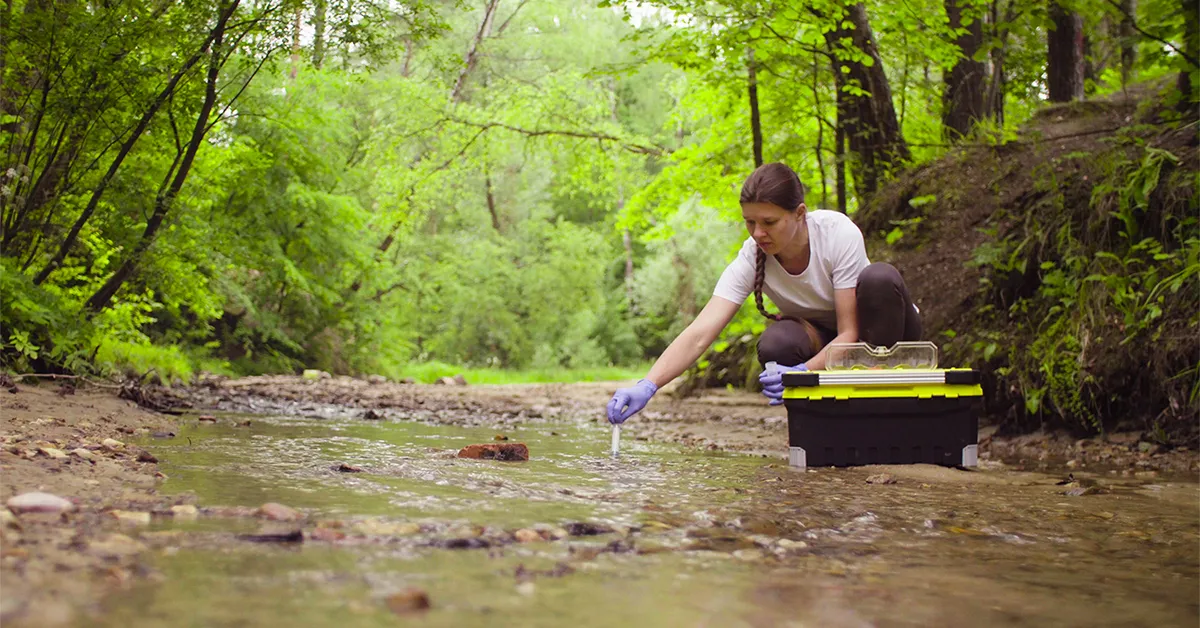Top Careers In Environmental Science
Environmental science is a rapidly growing field with careers that allow you to apply science to protect the natural world. But with so many options, how do you choose the right role? In this guide, we’ll explore three top careers in environmental science and the day-to-day responsibilities of each.
If you’re short on time, here’s a quick answer to your question: Common environmental science careers include environmental scientist, ecologist, and conservation scientist. Environmental scientists assess risks associated with pollution and find solutions.
Ecologists study ecosystems and how organisms interact with environments. Conservation scientists develop plans to preserve natural resources and protect endangered species.
Whether you want to solve environmental problems, protect wildlife and habitats, study Earth’s ecosystems, or raise awareness about sustainability, an environmental science career can help you make an impact.
Read on for a detailed overview of what it’s like to work as an environmental scientist, ecologist, and conservation scientist.
Environmental Scientist
Job Duties
An environmental scientist is responsible for studying and analyzing various aspects of the environment. They conduct tests, collect samples, and analyze data to assess the impact of human activities on the environment.
They also develop strategies and solutions to prevent or mitigate environmental damage.
Some of the common job duties of an environmental scientist include:
- Conducting field surveys and investigations
- Collecting and analyzing samples of air, water, soil, and other environmental elements
- Identifying and assessing environmental problems and risks
- Developing and implementing plans to prevent or reduce environmental damage
- Writing reports and presenting findings to clients or stakeholders
Work Environment
Environmental scientists work in a variety of settings, including offices, laboratories, and the field. They may spend time outdoors collecting samples and conducting field surveys. They may also work in research facilities or government agencies.
Depending on their specialization, environmental scientists may work in areas such as air quality, water resources, waste management, or conservation. They may also work in industries such as energy, agriculture, or transportation.
Environmental scientists often work full-time and may need to travel to different locations for fieldwork or meetings.
Skills Needed
To be successful as an environmental scientist, certain skills and qualities are essential:
- Strong scientific knowledge: Environmental scientists must have a solid understanding of scientific principles and methods.
- Analytical skills: They need to be able to analyze complex data and draw accurate conclusions.
- Problem-solving skills: Environmental scientists must be able to identify and develop solutions to environmental problems.
- Communication skills: They need to be able to effectively communicate their findings and recommendations to clients, stakeholders, and the general public.
- Attention to detail: Environmental scientists must be meticulous in their data collection and analysis.
- Ability to work in a team: They often collaborate with other scientists, engineers, and professionals to address environmental issues.
For more information on environmental science careers, you can visit https://www.bls.gov/ooh/life-physical-and-social-science/environmental-scientists-and-specialists.htm which provides detailed information about job outlook, median pay, and education requirements.
Ecologist
An ecologist is a professional who studies the relationships between organisms and their environment. They play a crucial role in understanding and preserving the delicate balance of ecosystems. Ecologists are responsible for conducting field research, collecting and analyzing data, and interpreting the findings to develop solutions for environmental issues.
Job Duties
Ecologists have a variety of job duties that can vary depending on their specialization. Some of the common tasks include:
- Conducting surveys and experiments to gather data on plants, animals, and ecosystems
- Collecting samples of soil, water, and air for analysis
- Monitoring the health of ecosystems and identifying potential threats
- Developing and implementing conservation and restoration plans
- Collaborating with other scientists and stakeholders to address environmental challenges
Ecologists often work in the field, spending time outdoors collecting data and conducting research. They may also spend time in laboratories analyzing samples and using advanced technologies to study the environment.
Work Environment
Ecologists work in a variety of settings, including government agencies, research institutions, consulting firms, non-profit organizations, and educational institutions. They may also work in the field, conducting research in diverse ecosystems such as forests, wetlands, deserts, or marine environments.
Fieldwork can be physically demanding, requiring ecologists to hike long distances, work in extreme weather conditions, and sometimes handle potentially dangerous organisms. However, it also provides opportunities to experience the beauty of nature and contribute directly to its conservation.
Skills Needed
To be successful as an ecologist, certain skills are essential:
- Strong analytical skills: Ecologists need to be able to analyze complex data sets and draw meaningful conclusions from them.
- Fieldwork proficiency: The ability to conduct research in the field, collect samples, and operate specialized equipment is crucial.
- Knowledge of ecological principles: A deep understanding of ecological concepts and theories is necessary to conduct meaningful research and make informed decisions.
- Communication skills: Ecologists need to communicate their findings effectively through reports, presentations, and publications.
- Collaboration: Working with other scientists, stakeholders, and communities is essential to address complex environmental challenges.
For those interested in pursuing a career as an ecologist, a strong background in biology, ecology, or a related field is typically required. Advanced degrees, such as a Master’s or Ph.D., may also be necessary for higher-level research positions.
For more information on careers in ecology, you can visit the website of the Ecological Society of America: https://www.esa.org/.
Conservation Scientist
Conservation Scientists play a crucial role in preserving and protecting our natural resources. They work to ensure the sustainable use of land, water, and other natural resources. Conservation Scientists conduct research, collect data, and develop plans to manage and conserve natural habitats.
Job Duties
Conservation Scientists are responsible for a variety of tasks related to environmental conservation. They assess the health of ecosystems, monitor wildlife populations, and develop strategies to protect endangered species.
They also work with landowners and government agencies to develop plans for sustainable land use and resource management.
Conservation Scientists spend a significant amount of time in the field, collecting data and conducting research. They may use equipment such as GPS devices, drones, and remote sensing technology to gather information about land use and vegetation.
They also analyze data and prepare reports to communicate their findings to stakeholders and policymakers.
Work Environment
Conservation Scientists work in a variety of settings, including forests, wetlands, and rangelands. They may also work in offices, conducting data analysis and preparing reports. Fieldwork can be physically demanding, as it often involves hiking long distances, camping, and working in all types of weather conditions.
Conservation Scientists may work for government agencies, non-profit organizations, or consulting firms. They collaborate with other professionals, such as biologists, foresters, and land managers, to develop comprehensive conservation strategies.
Skills Needed
To succeed as a Conservation Scientist, individuals need a strong background in environmental science or a related field. They must have excellent analytical and problem-solving skills to assess complex environmental issues and develop effective solutions.
Strong communication skills are also important, as Conservation Scientists often work with a variety of stakeholders.
Attention to detail is crucial for collecting and analyzing data accurately. Conservation Scientists should also be physically fit and comfortable working outdoors in challenging conditions. Additionally, knowledge of GIS (Geographic Information System) and other mapping software is often required.
For more information about careers in environmental science, visit Bureau of Labor Statistics.
Education Requirements
For individuals interested in pursuing a career in environmental science, a solid educational foundation is essential. Most entry-level positions in this field require at least a bachelor’s degree in environmental science or a related field such as biology, chemistry, or geology.
These programs typically involve coursework in ecological principles, environmental policy, data analysis, and fieldwork.
Graduate Degrees
While a bachelor’s degree is often sufficient for entry-level positions, obtaining a graduate degree can open up more advanced career opportunities. Many professionals in environmental science choose to pursue a master’s degree or even a Ph.D. in a specialized area of study.
These advanced degrees can provide individuals with a deeper understanding of complex environmental issues and enhance their research skills.
Continuing Education
Due to the constantly evolving nature of environmental science, it is crucial for professionals in this field to engage in continuing education. This can involve attending conferences, workshops, and seminars to stay updated on the latest research and technological advancements in the field.
Additionally, obtaining certifications from professional organizations can further enhance one’s qualifications and marketability.
Internships and Field Experience
While formal education is important, gaining hands-on experience through internships and fieldwork is equally valuable. Many universities and research institutions offer internships and cooperative education programs that allow students to apply their knowledge in real-world settings.
These opportunities not only provide practical skills but also allow individuals to network with professionals in the field.
Resources:
For more information on the education requirements for careers in environmental science, you can visit the following websites:
Salary and Job Outlook
When considering a career in environmental science, it’s important to take into account the salary and job outlook for professionals in this field. While salaries can vary depending on factors such as experience, education, and location, environmental scientists generally earn a competitive income.
Salary
The average salary for environmental scientists is around $71,360 per year, according to the Bureau of Labor Statistics. However, it’s worth noting that salaries can range from around $43,000 to over $122,000, depending on various factors.
For example, those with advanced degrees or certifications may command higher salaries.
Additionally, the specific industry in which an environmental scientist works can also impact their salary. For instance, those working in government agencies or consulting firms tend to earn higher salaries compared to those in non-profit organizations or research institutions.
Job Outlook
The job outlook for environmental scientists is quite promising, with a projected growth rate of 8% from 2018 to 2028, which is faster than the average for all occupations. This growth is driven by various factors, including the increasing awareness of environmental issues and the need for sustainable practices in industries such as energy, construction, and agriculture.
Environmental scientists play a crucial role in helping organizations comply with environmental regulations, conducting research to identify and mitigate environmental hazards, and developing strategies for conservation and sustainability. As such, their skills and expertise are in high demand.
Furthermore, as the world continues to prioritize sustainability and environmental stewardship, the demand for environmental scientists is expected to increase. This creates excellent opportunities for those interested in pursuing a career in this field.
Additional Resources
If you want to learn more about the salary and job outlook for environmental scientists, check out these reputable sources:
- Bureau of Labor Statistics – Environmental Scientists and Specialists
- EnvironmentalScience.org – Environmental Scientist Career Guide
By exploring these resources, you can gain further insights into the salary ranges, job prospects, and potential career paths in environmental science.
Conclusion
Environmental science offers diverse career paths focused on understanding ecosystems, identifying environmental risks, and promoting conservation. As an environmental scientist, ecologist or conservation scientist, you can conduct field studies, analyze data, develop solutions to ecological problems, inform policy decisions, and educate the public on sustainability.
All three careers require a strong foundation in natural sciences along with field work experience. Key skills include critical thinking, data analysis, scientific writing, and teamwork. But each role also has its unique day-to-day responsibilities based on its specialty area within environmental science.
With climate change, pollution, and loss of biodiversity threatening our planet, environmental science professionals are needed more than ever. If you are passionate about the natural world and want to make a difference through science-based environmental work, one of these dynamic careers could be an excellent fit.







